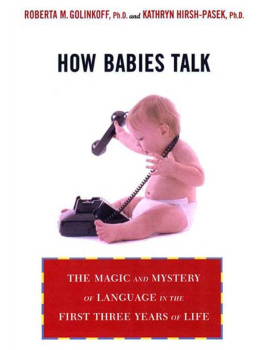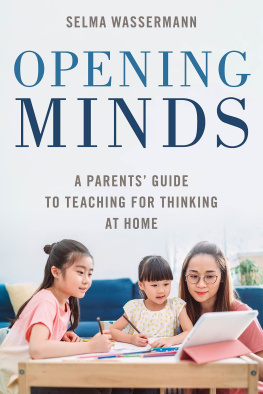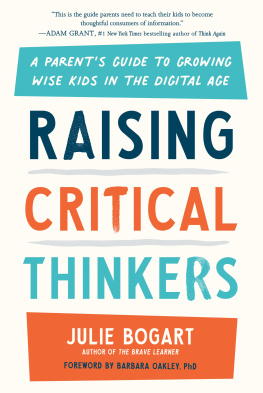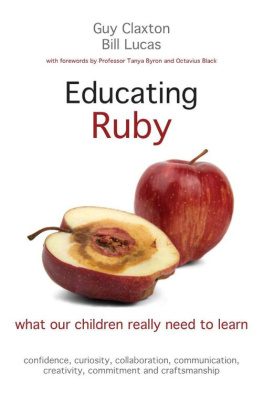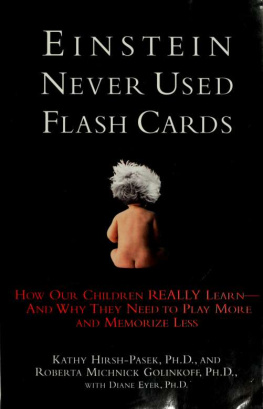Copyright 2016 by the American Psychological Association. All rights reserved. Except as permitted under the United States Copyright Act of 1976, no part of this publication may be reproduced or distributed in any form or by any means, including, but not limited to, the process of scanning and digitization, or stored in a database or retrieval system, without the prior written permission of the publisher.
Electronic edition published 2016.
ISBN: 978-1-4338-2240-7 (electronic edition).
Published by
APA LifeTools
750 First Street, NE
Washington, DC 20002
www.apa.org
To order
APA Order Department
P.O. Box 92984
Washington, DC 20090-2984
Tel: (800) 374-2721;
Direct: (202) 336-5510
Fax: (202) 336-5502;
TDD/TTY: (202) 336-6123
Online: www.apa.org/pubs/books
E-mail:
In the U.K., Europe, Africa, and the Middle East, copies may be ordered from
American Psychological Association
3 Henrietta Street
Covent Garden, London
WC2E 8LU England
Cover Designer: Naylor Design, Washington, DC
The opinions and statements published are the responsibility of the authors, and such opinions and statements do not necessarily represent the policies of the American Psychological Association.
Library of Congress Cataloging-in-Publication Data
Names: Golinkoff, Roberta M., author. | Hirsh-Pasek, Kathy.
Title: Becoming brilliant : what science tells us about raising successful children / Roberta Michnick Golinkoff, PhD, and Kathy Hirsh-Pasek, PhD.
Description: First edition. | Washington, DC : American Psychological Association, [2016] | Series: LifeTools | Includes bibliographical references.
Identifiers: LCCN 2015045395 | ISBN 9781433822391 | ISBN 1433822393
Subjects: LCSH: EducationParent participation. | Learning. | Child development. | Child psychology. | Success.
Classification: LCC LB1048.5 .G65 2016 | DDC 155.4/1315dc23
LC record available at http://lccn.loc.gov/2015045395
British Library Cataloguing-in-Publication Data
A CIP record is available from the British Library.
First Edition
http://dx.doi.org/10.1037/14917-000
We dedicate this book to our future:
Ellie, Elio, Marina, Beau, Dominic, Lilah, Shai, Barbara, and to children everywhere. Our goal is to make education worthy of everyones children and grandchildren.
CONTENTS
ACKNOWLEDGMENTS
Luck. How did we get so lucky? When we met at the University of Delaware lo those many years ago for an institute on the origins and growth of communication funded by the Carnegie Foundation and the Society for Research in Child Development, who could have predicted that we would be collaborating 35 years later? We feel so lucky to have each other to think with, to write with, to argue with, and to play and laugh with. But our luck continues. Each semester when we have a party for our labs (Robertas at the University of Delaware; Kathys at Temple University), we write To the best lab ever on the cake we invariably serve. And the funny thing is, it is always true. We have had wonderful students who have fine minds they share with usboth graduate and undergraduateas well as postdoctoral fellows.
And our luck continues. We have five children between us, each of whom has unique and lovable gifts. They gave us the on-the-ground experience we needed to understand the trials and tribulations of parenthood. One of our books said, To our children, delightful sources of inspiration and fatigue. The fatigue is gone! Now we have only the inspiring recollections. We also have a new, delicious fatigue from attending to our active (and of course, brilliant) grandchildren.
Our own children experienced a certain set of cultural circumstances and lived in a certain time. Our grandchildrento whom this book is dedicatedhave inherited a whole new world full of media and tablets and cell phones that did not exist 15 years ago. Like a galloping horse picking up speed, the pace of change we and our families are experiencing is ever increasing. But some things stay constant, despite the fact that there may be robots entering preschools: the need for children to be nurtured, to be made to feel safe, and to avoid trauma.
In this book, we share the work of our colleagues around the world about what is best for children and what they will need to be productive members of their community, good citizens of the world, responsible stewards of their own lives and destinies, and successful people to boot. The cacophony of child-rearing advice is becoming ever louder, and parents struggle to know whom to trust. Our answer is to trust the science of learning and developmental science, fields in which we are card-carrying members. The accumulated wisdom of the scientists in these fields is a tale that tells itself. This tale empowers parents to feel competent and comfortable in raising their children. As in our earlier book, Einstein Never Used Flash Cards, this book too encourages parents to reflect, resist, and re-center in the face of marketplace pitches about essential educational toys and apps and child-rearing advice from celebrities with few credentials.
But we did not get here on our own. We thank our colleagues far and wide for the magnificent insights and research findings that we have tried to weave into a coherent tapestry for our readers. We also thank the mentors we continue to carry in our heads who set a high bar for our research and reading of the science. Among them are Lila and Henry Gleitman of the University of Pennsylvania and George Suci and Eleanor Gibson of Cornell University. And we thank our funders and supporters without whom this work would have been impossible: Dr. Stan and Debra Lefkowitz, the National Institutes of Health, the National Science Foundation, the Institute of Education Sciences, the Bezos Family Foundation, and the William Penn Foundation. Kathy is also now a Senior Fellow of the Brookings Institution, and our discussion reflects conversations with Rebecca Winthrop at the Center for Universal Education.
Our own childrenJordan, Allison, Joshua, Benj, and Mikeyare our best critics and do not hesitate to tell us when they think we are wrong. Our stepchildren, Sasha, Ivin, and Chloe, are perfect sources of support and some are moles into the daily world of early childhood, as are the children we have gained from marriage: Laura, Liz, Dee, Meghan, and Barry. We are grateful to them all for their technical and intellectual reinforcement and for helping us see the world through their eyes. Bundles of energy and inspiration, our grandchildren continually add to our joy and challenge us to imagine what their futures will be like.
Our beloved and devoted husbands, Larry Ballen and Jeffrey Pasek, gave us constant and active encouragement, business acumen, and legal genius. In the olden days, behind every successful man was a woman. In todays world, women like us are lucky to have sensitive and brilliant men at our backs who are secret psychologists at heart.
Finally, there are a few special people without whom this book would never have been possible. Liz Edersheim, a dear friend, protge of Peter Drucker, and author of several business books, including The Definitive Drucker, was a mentor for us. She helped us see how current trends in business were melding with those in education. It is imperative to envision an evidence-based educational system that makes contact with the workforce of the 21st century. All too often that link is never made.


